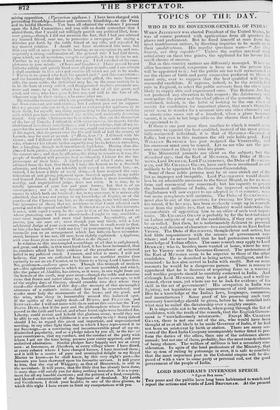TOPICS OF THE DAY.
WHO IS TO BE GOVERNOR-GENERAL OF INDIA?
WHEN JEFFERSON was elected President of the United States, be was of course pestered with applications from all quarters ti,z places and preferment. But he freed himself at once from the most troublesome suitors, by directing inquiries to be made as to their qualifications. His regular questions were—" Are tinj honeNt, are they capable?" Unless the replies received were satisfactory on these two points, the applicant fur his favour small chance of success.
But in this country matters are differently managed. When an office becomes vacant, conjecture is busy as to the person xvii4 will be appointed to it ; but the public are too well accustomed e) see the claims of birth and party connexion preferred to tho,.c merit only, ever to suppose that the best qualified will In' rho successful candidate. It appears, indeed, to be the establi,let rule in England, to select the public servants from the cla-'s likely to supply able and experienced ones. The Reform Act has not produced any alteration in this respect : the Aristocracy slid monopolize the power and the chief offices of the government. So confirmed, indeed, is the habit of looking to the one class of satiety for candidates for important places, that men's thuai never seem to wander for a moment into any other channel ; and in ninety-nine cases out of a hundred, when a place become: vacant, it is safe to bet large odds on the chance that a Lord will be ;appointed to it.
If there is one post more than another to which it would seem necessary to appoint the best-imalitied, instead of the most pow,r- fully-connected individual, it is that of Governor-General of India ; but even in this instance the old rule holds good. Loot WILLIAM BENTINCK has just resigned the Viceroyalty, and his successor must soon be named. Let us see who arc the per- sons mentioned as likely to take his place.
The Ministerial journals are silent on the subject ; but the Standard sav, that the Earl of MUNSTER, the Duke of Rut ft- muND, Lord DURHAM, Lord PALMERSTON, the Duke of B 1.7C K N;;- 11.131, and Mr. CHARLES GRANT, have each been mentioned as not unlikely to be appointed to the Governor-Generalship.
Some of these noble persons may be at once struck out of the list as improper and incapable. Lord PALMERSTON would doubt- less be an admirable successor to the Great Mogul, as far as mele form and ceremonial are concerned ; but his capacity to govern the hundred millions of India, on the improved system which Englishmen will now expect to see adopted in ti,it country, nose but mere sycophants will maintain. The Duke of liocruNotes:t must also be out of the question; for (waving his Tory politics), his talent, if lie has any, has been so closely wrapt up in conceal- ment from the public eye, that no Ministry would undertake the responsibility of appointing him to an office of such vast impor- tance. Mr. Cir ARLES GRANT is probably by far the best-informed on Indian subjects of any of the candidates, if they can properly be so called. But then, lie is unfortunately deficient in personal energy, and decision of character—two essentials in an East Indian Viceroys The Duke of RicitAIOND, though clever and active, has had little acquaintance with the science of government any- where; and we never heard that he had pretensions to especial knowledge of Indian affairs. The same remark may apply to Lord DURHAM ; who is, besides, more wanted at home, where he may yet be Viceroy over the Governor-General. The pretensions of the Earl of MUNSTER seem to be superior to those of the other candidates. He is described as being active, intelligent, and de- termined : lie has also served in India with credit. But on some accounts he would be a dangerous person. There is reason to apprehend that he is desirous of acquiring fame as a warrior; and warlike projects should be carefully eschewed in India. And although Lord MUNSTER may be a good soldier, and a well-in- formed, clever man, yet where are we to look for evidence of his skill in the art of government? His occupation in India was fighting, not legislation or the improvement of civil institutions. Has he a knowledge of the Indian laws, languages, commerce, and manufactures ? Some proof of his possessing such very necessary knowledge should be given, before he be installed into what may be called the dictatorship over a mighty empire. It is impossible not to be struck, when going through the list of candidates, with the truth of the remark, that the English Govern- ment is " unwholesomely aristocratic." Except Mr. CHARLES GRANT, there is not one out of the six, who would have beefs thought of as at all likely to be made Governor of India, if he had not been an aristocrat by birth or station. There are many ser- vants of the East India Company incomparably better fitted to per- form the duties of the office, than any of the noblemen above- named; but not one of them, probably, has the most remote chance of being chosen. The welfare of millions is but a secondary con- sideration. In spite of the loud professions of the Ministry, that the sy,tem of ruling by patronage is over, it is safe to conclude that the most important post in the Colonial empire will be dis- posed of with a view to some party or personal end, not the good government of the people of India.




















 Previous page
Previous page